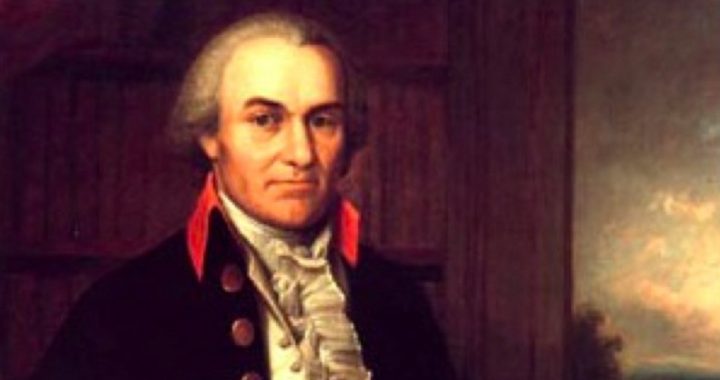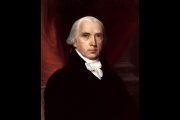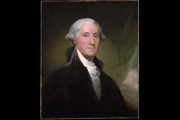
As hundreds of Republican representatives in Congress betray their oaths of office and hand extraordinary unconstitutional powers to the president, it is imperative that state legislatures and governors step into the breach and protect the Constitution.
Two hundred and twenty-eight years ago, on June 20, 1787, the delegates at the Constitutional Convention in Philadelphia spoke out in favor of retaining the federal structure of the union in the new government they were creating.
There was a motion made on that day to include a provision in the Constitution declaring that “the national government ought to consist of a supreme Legislative, Executive and Judiciary.”
Immediately, Oliver Ellsworth (shown) of Connecticut objected to the language, recommending the sentence to be altered to read: “the government of the United States ought to consist of a supreme Legislative, Executive and Judiciary.” Nathaniel Gorham of Massachusetts seconded the motion.
According to the notes made by James Madison, Ellsworth was worried that a national government would destroy the states and thereby destroy the union.
“I could not admit the doctrine that a breach of any of the Federal Articles could dissolve the whole. It would be highly dangerous not to consider the Confederation as still subsisting,” Ellsworth said.
In his remarks on that day, Ellsworth foresaw a couple of potential pitfalls that could keep the Constitution from lasting very long.
First, he reminded his fellow delegates that the changes they proposed should be sent to the states for ratification, not to the people.
“If the plan goes forth to the people for ratification, several succeeding conventions within the States would be unavoidable,” he warned.
The Constitution’s prescribed method of its own ratification reveals that a plurality of states, not citizens, would be required before the document became the law of the land.
Not once during the deliberations at the Constitutional Convention was there a proposal that their work be presented for approval to the body of the populace acting as individuals. From the beginning of the process that culminated on September 17, 1787 with the signing of the Constitution, it was understood that the ratification by at least nine states was the sine qua non of the start of the new government.
Still, the ranks of the Establishment are full of compact theory deniers who obstinately deny one irrefutable fact: The Constitution never would have gone into legal effect and the federal government never would have been created if state conventions had not met and ratified the document.
In fact, the first Congress would never have considered a single bill if their authority was recognized by a supermajority of Americans, but rejected by the state ratifying conventions. Not even the most zealous supporter of the Constitution would have assumed the new government would have been authorized to act by an affirmative popular vote.
There are two reasons why a popular vote would never had been accepted as a substitute for state ratification. First, the Constitution itself contains no mechanism for popular ratification. Second, the people, since the earliest days of their resistance to British tyranny, had expressed their opposition through their collective capacity as colonies or states. Review the record of the rebellion: Albany Plan of Union, Declaration of Independence, Continental Congress, Articles of Confederation, etc. Not one of these milestones on the road to independence was written, voted on, ratified, or sent to King George by “the American people.” They were sent in the name of the organized political units the Americans had already formed: the states.
Another equally important question is why Americans always acted as states and colonies rather than as a people, taking votes, counting the yeas and nays, and appending their names to petitions. The answer lies in the definition and locus of sovereignty.
Sovereignty is the “supreme and independent power or authority in government as possessed or claimed by a state or community.” Americans of the Founding generation, and for a century before that, firmly held that sovereignty rested in the representative bodies they formed. Did the Mayflower Pilgrims, for example, land in America and begin dealing individually with Mother England? Did the Jamestown colonists on their own or in their own names communicate with the crown and Parliament? No. Houses of Burgesses, committees, etc. were the vehicles chosen by American Britons to convey their concerns to London.
Never — either in the history of the settlement of the American colonies, or in their history of regaining their independence and subsequent union as states — is there an example of citizens resisting tyranny in their capacity as individuals. As explained above, every time these former Englishmen pushed back against the crown’s consolidation of power, it was done in the name of the colonies, not the colonists.
Ellsworth understood this and he wanted to remind representatives of this fact.
The second thing — and perhaps most important for our day — that Ellsworth spoke out against on June 20, 1787 was the danger to the Constitution that would come from additional conventions, particularly those called to propose amendments.
Ellsworth said that he “did not like these conventions,” adding, “They were better fitted to pull down than to build up constitutions.”
Some self-described “constitutional experts” seem ignorant of this fear shared by the Founders.
Ellsworth wasn’t the only one to warn people about this tendency.
Writing as “Federal Farmer,” an anonymous patriot echoed Ellsworth’s admonition:
While power is in the hands of the people, or democratic part of the community, more especially as at present, it is easy, according to the general course of human affairs, for the few influential men in the community, to obtain conventions, alterations in government, and to persuade the common people they may change for the better, and to get from them a part of the power.
Despite assurances offered by the various proponents of an Article V convention (so-called “amendments convention”) that the delegates to such a meeting would not exceed its published mandate (a balanced budget amendment, for example), there is no guarantee.
The outcome of an amendment convention could range from a textbook following of the script for proposing a BBA and nothing else, all the way to a runaway convention based on the right of the people in convention to revise their government when it becomes destructive of the ends of securing our God-given rights. This is the crux of the argument against convening an Article V con-con, no matter how loudly the proponents of such a convention assure us that they can limit the number of amendments and/or the content of the amendments that would be considered.
Over the past 30 years, most state legislators have wanted no part of an unlimited con-con, and have accordingly voted no on most new con-con proposals. In fact, over the past 24 years nearly 20 state legislatures have gone further and voted to rescind all previously passed Article V con-con calls still on their books.
If the amendments convention were to become a runaway convention, many dangerous amendments could be proposed. However, con-con proponents assure us that we do have a safeguard against dangerous or harmful amendments. Following the precedents of our original Constitutional Convention in 1787 and the provisions in Article V of our present Constitution, such a convention would only propose amendments that would then be submitted for ratification by the states, either by state legislatures or state conventions.
Nonetheless, this safeguard has not been effective in stopping all bad amendments. For example, three-fourths of the states ratified the 16th (establishing the income tax), the 17th (establishing the direct election of senators), and the 18th (establishing the prohibition against alcoholic beverages) Amendments. Most constitutionalists believe all three amendments were harmful, yet all three were duly ratified.
On this anniversary of Oliver Ellsworth’s speech at the Constitutional Convention, Americans should remember his words and his warnings.



